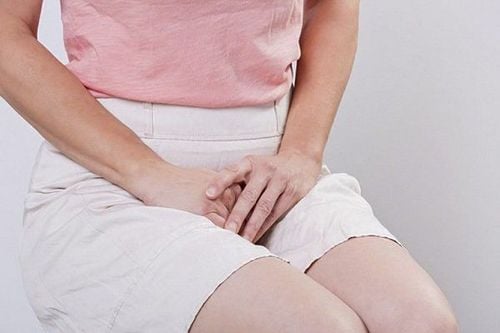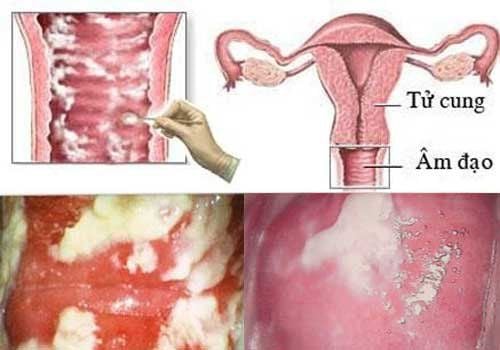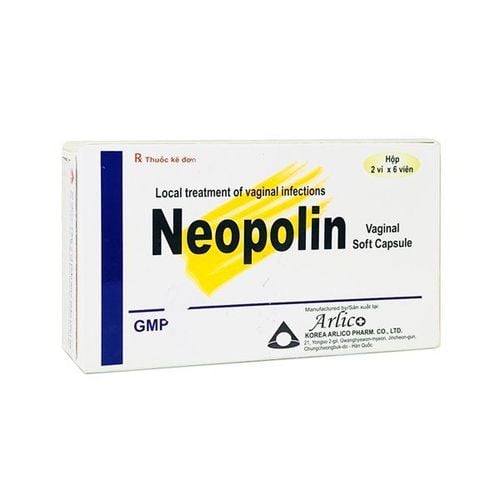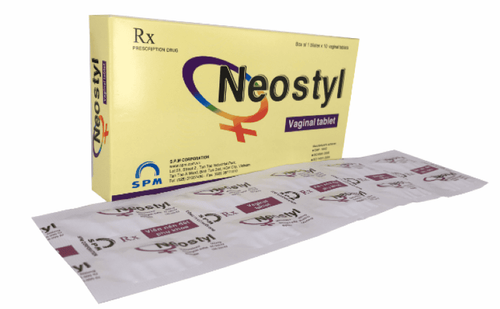This is an automatically translated article.
Vaginal candidiasis (yeast infection) is very rare in children unless the child is immunocompromised or on antibiotics. Girls are especially susceptible to vulvovaginitis. Because the genital area is close to the rectum, bacteria (and sometimes pinworm-like parasites) spread easily. In addition, children can spread respiratory infections caused by bacteria from the nose, mouth to the vulva. In addition, the skin of a baby's vulva is thin and sensitive to trauma from scratches, rubbing from tight clothing, or exposure to irritants such as strong soaps. In this article, we will provide useful information to help caregivers promptly recognize and have solutions when children have vulvovaginitis.
1. What is vulvovaginitis?
When girls complain of pain or itching in their vulva, it may be a sign of vulvovaginitis or vaginitis. This is inherently a common gynecological problem in young girls, during puberty or before marriage, however, vulvovaginitis can occur at any age. Usually, people with vaginal infections are most often caused by sexual activity, but in children who have not yet reached puberty, they are especially susceptible to vulvovaginitis for reasons that are not related. sexual activity. Because girls at this age have not yet developed their sexual organs, so they don't have pubic hair and labia to protect them, so there are cases where clothes, chemicals, soaps and drugs can easily cause harm. irritation of the delicate skin of the vulva. Even a single foreign object in contact with this sensitive area can cause inflammation, as simple as a piece of toilet paper can cause an illness in a child.
Unlike adult women, girls at this age also do not have estrogen secreted to protect the vaginal tract and the pH of the vagina increases, which is a fertile environment for bacteria to grow. Or sometimes it's because the child is not yet able to practice proper vaginal hygiene. In many cases, vulvar pain and foul-smelling discharge are usually not serious. Even for some girls, frequent vulvovaginitis doesn't have much of an effect on sex or fertility later in life.

Các bé gái đặc biệt dễ bị viêm âm hộ
2. Symptoms of vulvovaginitis
Before the baby complains of pain in the private area, observant parents can completely observe the child scratching or sitting uncomfortably. Very soon, however, children will let their parents know they are feeling pain because in most cases the inflammation will cause the vulva to become extremely irritated and painful to the point of making the child unable to breathe. sleep well. On examination, parents may notice that the child's private area is red and swollen with a discharge that has a very unpleasant odor but is usually not accompanied by blood.
Your baby may also feel a burning pain when urinating. This is the result of urine touching the irritated skin. These symptoms should be clearly distinguished because they are often confused with urinary tract infections.
3. What causes vulvovaginitis?
There are different types of vulvovaginitis and their associated causes, ranging from wet underwear to parasitic infections. Some more serious causes such as tumors can occur but are extremely rare. Here are some possible causes of an infection in your baby's vulva:
Bacterial imbalance: Don't mistake a healthy vagina for a bacteria-free vagina. Probiotics are always present in this environment and vaginitis can occur when the normal balance of different bacteria is disturbed. Especially in the case of beneficial bacteria decreasing in number will cause harmful bacteria to grow and cause inflammation. Secondary infection: Sometimes vulvovaginitis can occur due to a secondary infection. This means that if your baby has had a sore throat recently, the strep bacteria can travel to the vagina and cause an infection in this area. In this case, the vulva is bright red and often causes an extremely uncomfortable burning sensation. Improper cleaning. The distance between the vagina and the anus is relatively close. Therefore, when children have not learned how to clean properly, bacteria in the anus can completely invade and cause vulvovaginitis. In addition, the position when urinating can also cause urine to back up into the vagina and cause an infection.

Trẻ đi vệ sinh không đúng cách cũng có thể gây ra viêm âm hộ
Parasitic infections: Pinworms or threadworms are very common parasites in children. Pinworms often lay eggs around the anus and if the child does not clean properly, the eggs can enter the genital tract and cause an infection there. Foreign body: Pieces of toilet paper or other objects can get stuck in your baby's vagina, causing a foul odor, discharge, or even bleeding. External irritants: Sometimes hot weather or wearing clothes that are too tight or not breathable like jeans and nylon pants can make sensitive areas of the skin, including the umbilicus. Inflammation of the skin around the vagina. In addition, soaps or cleaning solutions with strong antiseptic properties can also cause redness and itching. Fungal: While fungal infections are a major concern for many women, they are not usually present in girls who have not yet reached puberty unless they have recently been treated with antibiotics that have brought the balance back to life. by the bacterial flora in the vulva is turned upside down. The fungus will cause the vulva to be red, painful, and a yellow-white discharge. Sexual abuse. This is a delicate cause but still needs to be mentioned because having sex too soon can lead to some genital infections such as trichomonas, chlamydia and gonorrhea .... Vaginal adhesions: According to statistics , in about 2% of cases in girls 6 years and younger with adhesions on the inner lip of the vagina or labia. Vulvar adhesions are not a serious medical condition, but they can also contribute to an increased risk of vulvovaginitis. Skin diseases: Lichen scleroderma is an uncommon condition characterized by patches of thin, patchy skin, often in the genital area. They often irritate the baby's skin and increase the risk of vulvovaginitis.
4. Diagnosis and treatment of vulvovaginitis
The first thing doctors do to diagnose vulvovaginitis is to talk to the parents and the child themselves about the symptoms or any recent illness as well as the medications the child is taking. use. In addition, doctors may also explore how parents bathe their children, what clothes they usually wear, or even how they wipe their bodies.

Cha mẹ nên trao đổi với bác sĩ về chính bản thân và các triệu chứng của trẻ
Then the doctor will gently examine the baby's external genital area. This will likely be done by a female doctor so as not to upset the baby. If there is discharge, the doctor can use swabs to take a sample for testing.
The treatment of vulvovaginitis in children depends on the cause of the disease. If it is a bacterial infection, your baby will be prescribed with some antibiotics. The doctor will also talk to parents about immediate pain relief through warm, soap-free baths, cool compresses, salt water baths, and possibly some wet wipes for sensitive skin. sense for hygiene. In addition, doctors will also advise mothers to clean their babies by wiping from front to back and wearing loose cotton clothes and always keeping the vulva dry.
Depending on the diagnosis, your doctor may also prescribe some topical antibiotics, antifungal creams, hydrocortisone creams, or ointments to speed healing and ease the pain. It is important to keep sensitive lips free from constant irritation, as irritated tissue is more likely to become infected than normal tissue and the vaginal area (usually moist and warm) is the perfect environment. for harmful organisms to grow.
5. Prevention of vulvovaginitis
There is no guarantee that girls this age will not get vulvovaginitis. However, here are a few things parents can do to minimize the risk of recurrent and new vulvovaginitis:
Keep your baby's private area as clean as possible by wiping from front to back. after going to the toilet, thereby forming a good habit for children. Encourage your child to urinate by extending his knees, this will prevent urine from backing up into the vagina. Teach children to wash their hands thoroughly both before and after using the toilet.

Cha mẹ hướng dẫn trẻ rửa tay kỹ trước và sau khi đi vệ sinh
Choose soft toilet paper, less skin irritation and do not use scented toilet paper. Avoid using strong soaps or cleaning solutions that are easy to irritate the skin. In case your baby often has vulvitis, switch to a shower and minimize the use of soap in the baby's genital area. Make sure the baby is completely dry as well as the genitals after bathing. Vulvitis is not a life-threatening condition for a child, but it can make him feel uncomfortable and lack confidence when communicating with friends. The risk of vulvovaginitis can be minimized as much as possible if mothers pay more attention to hygiene for their baby's genitals as well as follow some rules of clothing including not wearing pants. tight jeans, do not wear nylon underwear or clothing that restricts the circulation of air. Besides, it is necessary to make sure that the child's genitals are always dry after bathing as well as wiping from front to back after using the toilet.
If you have a need for medical examination with experienced pediatricians at Vinmec, please make an appointment on the website to be served
Please dial HOTLINE for more information or register for an appointment HERE. Download MyVinmec app to make appointments faster and to manage your bookings easily.
Reference sources: babycenter.com, boltonft.nhs.uk
MORE:
Warning signs of vaginitis Vaginitis treatment What to do when you have bacterial vaginosis?













